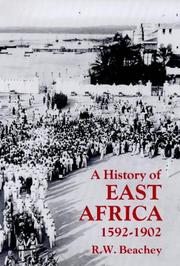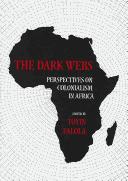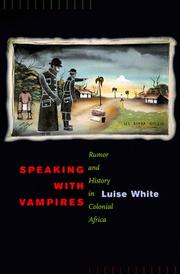| Listing 1 - 10 of 50 | << page >> |
Sort by
|
Book
ISBN: 9781138868861 Year: 2014 Publisher: New York ; London : Routledge,
Abstract | Keywords | Export | Availability | Bookmark
 Loading...
Loading...Choose an application
- Reference Manager
- EndNote
- RefWorks (Direct export to RefWorks)
This book develops a theory of a Caribbean-Atlantic imaginary by exploring the ways two colonial texts represent the consciousnesses of Amerindians, Africans, and Europeans at two crucial points marking respectively the origins and demise of slavocratic systems in the West Indies. Focusing on Richard Ligon's History of Barbados (1657) and Matthew 'Monk' Lewis' Journal of a West India Proprietor (1834), the study identifies specific myths and belief systems surrounding sugar and obeah as each of these came to stand for concepts of order and counterorder, and to figure the material and symbolic power of masters and slaves respectively. Rooting the imaginary in indigeus Caribbean myths, the study adopts the pre-Columbian origins of the imaginary ascribed by Wilson Harris to a cross cultural bridge or arc, and derives the mythic origins for the centrality of sugar in the imaginary's constitution from Kamau Brathwaite. The book's central organizing principle is an oppositional one, grounded on the order/counterorder binary model of the imaginary formulated by the philosopher-social theorist Cornelius Castoriadis. The study breaks new ground by reading Ligon's History and Lewis' Journal through the lens of the slaves' imaginaries of hidden kwledge. By redefining Lewis' subjectivity through his poem's most potent counterordering symbol, the demon-king, this book advances recent scholarly interest in Jamaica's legendary Three Fingered Jack.
Littérature antillaise de langue anglaise --- Littérature caribéenne --- Obeah --- Thèmes, motifs. --- Influence coloniale. --- Dans la littérature.

ISBN: 185043994X Year: 1996 Volume: v. 3 Publisher: London : I.B. Tauris & Co.,
Abstract | Keywords | Export | Availability | Bookmark
 Loading...
Loading...Choose an application
- Reference Manager
- EndNote
- RefWorks (Direct export to RefWorks)
Covering a vital period in the history and development of East Africa this narrative history of the vast region explores the diverse cultural influences of the Arab peoples who traded with East Africa and settled there, Portuguese traders who arrived from the late 17th century onwards and the first wave of settlers from the Indian Subcontinent who arrived in the 19th century. Focusing in particular on the emergence of the slave trade and the subsequent anti-slave trade campaigns, the book is based on contemporary and little known sources. The author shows how rivalries between Britain, France, Germany, Belgium and America were played out in this region prior to the early years of the British colonial administration and settlement. Special attention is given to a number of key issues such as Lugard's land settlement in Ugandathe demarcation of boundaries and the rounding out of frontiersthe role of the Imperial British East Africa Company in the partition of East AfricaAnglo-German rivalry and the foundation of German East Africathe little-known story of Italian ambitions in the regionthe completion of the Uganda Railway to Lake Victoriaand the concept of British East Africa as two distinct parts: Uganda and the East Africa Protectorate. The emphasis of Beachey's book is part-diplomatic and international history, part exploration and colonial history, and focuses on the early industrial and infrastructural development of the region, and the beginnings of white settlement in Kenya.
Africa, East --- Africa --- Afrique orientale anglophone --- Afrique --- History. --- Colonial influence --- History --- Histoire --- Influence coloniale --- Afrique de l'est

ISBN: 0890895821 9780890895825 Year: 2005 Publisher: Durham : Carolina Academic Press,
Abstract | Keywords | Export | Availability | Bookmark
 Loading...
Loading...Choose an application
- Reference Manager
- EndNote
- RefWorks (Direct export to RefWorks)
This book is an intellectual history of colonialism in Africa. The book focuses on ideas espoused by historians and creative writers on various aspects of colonial rule; the sources of the ideas; the vision of a post-colonial society that they created; and a critique of those ideas. Some essays focus on the works of notable scholars such as Ruth First and Ade Ajayi, while some chapters review themes of broad historiographical significance. In the first part of the book, eight scholars provide various examinations of the context to understand the colonial period, with emphasis on the historical linkages between the colonial era and the post-colonial, nationalism, pan-Africanism, new identities, and new agencies of control. The second part analyzes a number of key literary texts, drawing from the writings on apartheid in South Africa, the works of Ngugi Wa Thiong'o, Micere Mugo, and V.Y. Mudimbe. In the third part, seven essays examine the ideas of Kenneth Dike, Betwell Ogot, Adu Boahen, Ruth First, Ade Ajayi, Cheikh Anta Diop, and Robert Mugabe. In all, the book moves us in new directions in the study of colonial Africa. It provides the basis to understand the views of leading African scholars, and offers fresh insights on the nature of colonial power and the African encounter with imperialism.
Colonies --- Imperialism --- Postcolonialism --- Impérialisme --- Postcolonialisme --- Historiography --- Historiographie --- Africa --- Afrique --- Colonization --- Colonial influence --- Colonisation --- Influence coloniale --- Historiography. --- Impérialisme --- Colonies britanniques
Book
ISBN: 9780415632294 9780415632300 9781315797311 0415632293 0415632307 9781317753155 9781317753162 Year: 2015 Publisher: New York, N.Y. Routledge
Abstract | Keywords | Export | Availability | Bookmark
 Loading...
Loading...Choose an application
- Reference Manager
- EndNote
- RefWorks (Direct export to RefWorks)
Environmental planning --- urban planning --- Sub-Saharan Africa --- City planning --- Urbanisme --- Africa, Sub-Saharan --- Afrique subsaharienne --- Colonial influence. --- Influence coloniale --- Colonial influence --- History
Book
ISBN: 0195622375 Year: 1988 Publisher: Delhi ; Oxford : Oxford University Press,
Abstract | Keywords | Export | Availability | Bookmark
 Loading...
Loading...Choose an application
- Reference Manager
- EndNote
- RefWorks (Direct export to RefWorks)
Colonies --- Imperialism. --- East and West --- Impérialisme --- Orient et Occident --- Administration --- Psychological aspects. --- India --- Inde --- Civilization --- Colonial influence. --- Civilisation --- Influence coloniale
Book
ISBN: 9781501766442 Year: 2022 Publisher: Ithaca, New York : Cornell University Press,
Abstract | Keywords | Export | Availability | Bookmark
 Loading...
Loading...Choose an application
- Reference Manager
- EndNote
- RefWorks (Direct export to RefWorks)
"Examines a world famous yet critically under-examined event-UNESCO's 1960-80 International Campaign to Save the Monuments of Nubia-to show how the project, its genealogy, and its aftermath not only helped to propel archaeology into a changing world but also helped to 'recolonize' it"
Archaeology --- Archéologie --- Influence coloniale --- Social aspects --- Aspect social --- Campagne internationale pour la sauvegarde des monuments de Nubie --- Influence. --- Nubia --- Colonial influence. --- Archéologie
Book
ISBN: 9970020900 0852553994 Year: 1996 Publisher: Kampala : Cape Town : London : Fountain Publishers ; David Philip ; James Currey,
Abstract | Keywords | Export | Availability | Bookmark
 Loading...
Loading...Choose an application
- Reference Manager
- EndNote
- RefWorks (Direct export to RefWorks)
Apartheid --- Colonies --- Democracy --- Despotism --- Apartheid --- Colonies --- Démocratie --- Despotisme --- Administration. --- Administration --- Africa --- Africa --- Afrique --- Afrique --- Colonial influence. --- Politics and government. --- Influence coloniale --- Politique et gouvernement
Book
ISBN: 9780821421802 9780821421796 9780821445396 Year: 2015 Publisher: Athens, Ohio : Ohio University Press,
Abstract | Keywords | Export | Availability | Bookmark
 Loading...
Loading...Choose an application
- Reference Manager
- EndNote
- RefWorks (Direct export to RefWorks)
Miscegenation --- Métissage --- History --- Histoire --- Great Britain --- Ghana --- Grande-Bretagne --- Race relations --- Colonial influence. --- Social conditions --- Relations raciales --- Influence coloniale --- Conditions sociales --- Miscegenation (Racist theory) --- History.

ISBN: 9780520217041 0520217047 0520217039 Year: 2000 Volume: 37 Publisher: Berkeley London University of California press
Abstract | Keywords | Export | Availability | Bookmark
 Loading...
Loading...Choose an application
- Reference Manager
- EndNote
- RefWorks (Direct export to RefWorks)
During the colonial period, Africans told each other terrifying rumours that Africans who worked for white colonists captured unwary residents and took their blood. In colonial Tanganyika, for example, Africans were said to be captured by these agents of colonialism and hung upside down, their throats cut so their blood drained into huge buckets. In Kampala, the police were said to abduct Africans and keep them in pits, where their blood was sucked. This text presents and interprets vampire stories from East and Central Africa as a way of understanding the world as the storytellers did. Using gossip and rumour as historical sources in their own right, it assesses the place of such evidence, oral and written, in historical reconstruction
Afrique de l'Est --- --Afrique centrale --- --Vampire --- --Vampirisme --- --Folklore --- --Influence coloniale --- --Sang --- --Vampires --- Folklore --- Blood --- Colonisation --- --Culture conflict. --- Storytelling --- Folklore. --- Africa, Central --- -Colonial influence --- Vampire --- Vampirisme --- Influence coloniale --- Sang --- Vampires --- Culture conflict. --- Afrique centrale --- -Blood --- Africa, East --- Colonial influence. --- Afrique orientale anglophone
Book
ISBN: 0799219045 Year: 1998 Volume: 208 Publisher: [Cape Town] : University of Cape Town, Dept. of Communication,
Abstract | Keywords | Export | Availability | Bookmark
 Loading...
Loading...Choose an application
- Reference Manager
- EndNote
- RefWorks (Direct export to RefWorks)
Indigenous peoples --- Indigenous peoples --- Autochtones --- Autochtones --- Africa, Sub-Saharan --- South Africa --- Africa, Sub-Saharan --- South Africa --- Afrique subsaharienne --- Afrique du Sud --- Afrique subsaharienne --- Afrique du Sud --- Colonial influence --- Colonial influence --- Politics and government --- Politics and government --- Influence coloniale --- Influence coloniale --- Politique et gouvernement --- Politique et gouvernement
| Listing 1 - 10 of 50 | << page >> |
Sort by
|

 Search
Search Feedback
Feedback About UniCat
About UniCat  Help
Help News
News